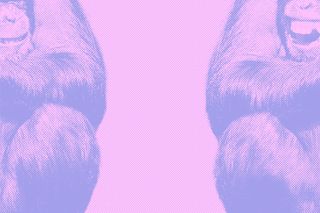
Why Do We Joke? Evolution Says We Needed To
Not only does it enable us to form bonds with other humans, it also helps us stay sane in a world ravaged by crisis and uncertainty.

Having analyzed 75 hours of video footage capturing showcasing the behaviors of chimpanzees, bonobos, gorillas, and orangutans in zoos, researchers were able to catalog myriad instances of playful teasing – including offering objects and then withdrawing them, preventing others from obtaining desired items, and disobeying commands, reminiscent of behaviors seen in human children as young as eight months’ old. Chimpanzees were found to engage in the most teasing – often involving disruptive behaviors like slapping dozing adults or obstructing their movements. Orangutans exhibited a talent for hair-pulling, while gorillas preferred shoving as a form of teasing. This led the researchers to conclude that the "cognitive prerequisites for joking" may have evolved in an ancestor shared by the great apes – including human beings – millions of years ago.
Now, the question is: why? While the exact purpose of teasing among apes remains uncertain, the study’s lead author, Isabelle Laumer, a cognitive biologist and primatologist at Germany's Max Planck Institute of Animal Behavior, was surprised to discover that it "rarely resulted in any aggressive behavior… The adults also reacted to this quite calmly.” This led the researchers to hypothesize that, perhaps, as among humans, teasing helps test social boundaries, fostering mutual enjoyment and potentially strengthening relationships between the prankster and their target.
Here’s how: in an ideal situation, humor elicits laughter, which can act as a social glue. “For people who are laughing together, shared laughter signals that they see the world in the same way, and it momentarily boosts their sense of connection,” Sara Algoe, a social psychologist from the U.S., once explained. “Perceived similarity ends up being an important part of the story of relationships… [Laughter] may have a lot of potential for helping people grease the wheels of their relationships in everyday life.”
Past research, too, has delved into the social benefits of humor – providing insights into how humor came to be from an evolutionary perspective. “[L]aughter[‘s]... principal function appears to be creating and deepening social bonds. As our ancestors began to live in larger and more complex social structures, the quality of relationships became crucial to survival. The process of evolution would have favored the development of cognitive strategies that helped form and sustain these cooperative alliances,” Jordan Raine, who has researched the nature and function of human non-verbal vocalizations at the University of Sussex, wrote in The Conversation.
Why Laughter With Friends Might Sound Different From Laughter Around a Love Interest
And, evidently, the kind of playful teasing that the present researchers observed among different species of great apes is precisely what forms the foundation of humor – and, by extension, laughter. Explaining, Raine says, “Laughter probably evolved from labored breathing during play such as tickling, which encourages cooperative and competitive behavior in young mammals. This expression of the shared arousal experienced through play may have been effective in strengthening positive bonds, and laughter has indeed been shown to prolong the length of play behaviors in both children and chimpanzees and to directly elicit both conscious and unconscious positive emotional responses in human listeners.”
Among humans, of course, humor evolved beyond physical teasing to using words; enter: jokes.
However, humor – despite its seemingly simple use – is actually a complex cognitive function that’s closely tied to human social abilities and language development, indicates a 2006 study. Having examined numerous theories on the structure and evolution of humor – alongside topics like animal behavior, genetics, children's humor, and its manifestations in different contexts – the researchers had concluded that language origins, spirituality, group dynamics, and teasing within the animal kingdom could hold significant clues to understanding the origins of humor among humans.
But humor does more than allow us to connect to others: research suggests humor can alleviate anxiety in the short term, making it easier for people to stay calm in stressful situations. For starters, making jokes about something one is stressed about gives one a semblance of control over their own emotional reaction to the situation. In addition, humor also allows them to shift their attitude from nervousness to amusement, from overwhelming to minor, as a 2019 study highlights. To make matters even better, laughter can trigger an increase in endorphins and dopamine – helping one feel good biologically, and signaling safety.
Is This Normal? “I Smile and Nod Even When I Want to Disagree”
Not only that, but "humor was selected by evolution in order to keep our facility for categorization flexible. When we have a good laugh we are looking at the world in a topsy-turvey configuration, which exercises our facility to flexibly redesign our relationships with one another and with reality," writes William Reville, emeritus professor of biochemistry at University College Cork.
Jokes also play in part in helping us choose our partners. "Once it evolved, humor became a social signal – we assume funny people are intelligent and friendly, and men and women alike prefer witty partners. On average, however, men tend to be more concerned that would-be partners will find their jokes funny, whereas women are more attracted to people who make them laugh," cognitive neuroscientist Christian Jarrett wrote in BBC Science Focus.
In a nutshell, then, we joke because… well, evolution says we must. Not only does it enable us to form bonds with other humans, it also helps us stay sane in a world ravaged by crisis and uncertainty. Actor-comedian John Marwood Cleese had said, “Laughter connects you with people. It’s almost impossible to maintain any kind of distance or any sense of social hierarchy when you’re just howling with laughter.” While not a scientist himself, Cleese may have accurately captured one of the many scientific – and evolutionary – reasons behind humor forming such an integral part of our day-to-day lives.
Published yesterday in the journal Proceedings of the Royal Society B, a new study explores the evolutionary roots of teasing behavior among great apes – in a bid to understand how joking became an everyday affair among humans.
Devrupa Rakshit is an Associate Editor at The Swaddle. She is a lawyer by education, a poet by accident, a painter by shaukh, and autistic by birth. You can find her on Instagram @devruparakshit.
Related


How the Conversation Around Sustainable Menstrual Products Ignores Autonomy, Health
